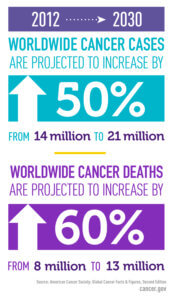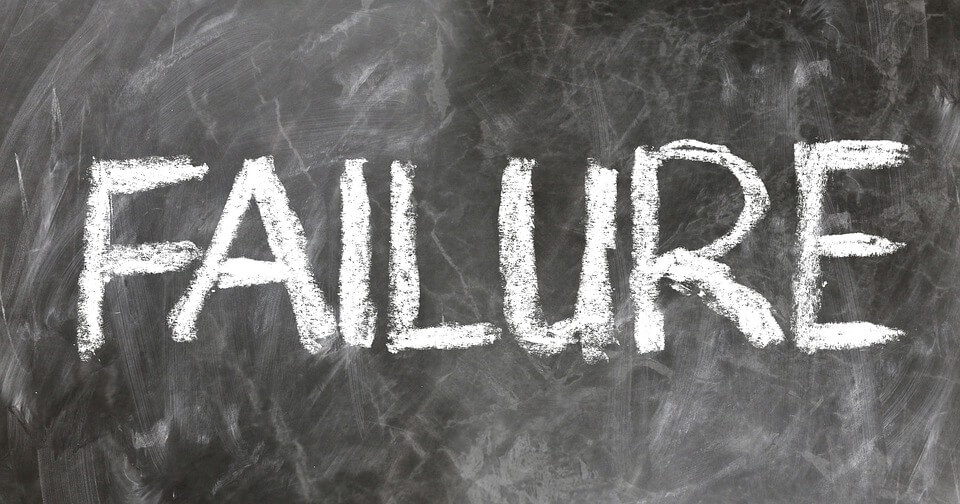Yes, even if you’re a prevention-focused dietitian like me, cancer just doesn’t give a shit. At the end of the day, breast cancer cares no more about my RD credentials than it does the substantial collection of half marathon (and other) race medals hanging in my closet. The message I want everyone to hear is that even if we drown ourselves in kale, lentils and running paths, there’s an absolute zero guarantee we’ll safely skirt cancer’s clutches.
There’s a reason you got breast cancer.
It may be a reason that actually makes sense.
Trouble is, you’ll likely never know for sure what it is.
While there are known risk factors that affect whether you might get breast cancer, only one can definitively be traced to a diagnosis. (1)
Being a woman.
I’m not aware of any research offering a definitive method to identify the exact cause of breast cancer in an individual – that information tends to remain a mystery.
We can surmise and we can infer, but except for lung cancer patients with a history of smoking (who my nurse navigator assured me never ask “why?”), or skin cancer, where sun exposure is the culprit, we can’t know conclusively.
Even knowing all of that, just last week I watched online interviews of two cancer survivors (one breast, one ovarian/uterine) who stated unequivocally that stress was the cause of their respective cancers.
How could they be so sure, I wondered?
It’s long been said that stress “contributes to” or “causes” breast cancer; I’ve heard that myself. Given the metabolic changes our body undergoes when experiencing stress, and newer research suggesting cancer may be a metabolic disease, it makes sense that stress may directly and indirectly disrupt normal cellular functioning. (2)
But CAN WE PROVE it scientifically?
Some epidemiologic research has observed a stronger association in studies looking at certain types of stressful life events and breast cancer incidence, in comparison to studies examining work-related, caregiving, or everyday/total stress and breast cancer incidence.
The particular study I reference here shows that most physiological studies reporting the effect of stress on DNA damage and tumor development are animal and cell line studies. While they’re interesting and certainly intriguing, we ultimately need gold standard human studies. (3)
Or do we? Do we need studies to prove that stress wrecks our healthy cells?
Maybe. Maybe not. It depends on who you ask.
As a registered dietitian I’m bound by professional responsibility and ethics to use evidence-based recommendations in my work, which means I need valid proof to support all findings in the worlds of breast cancer nutrition, fitness and wellness.
I also have strong personal integrity that would never allow me to intentionally misguide anyone in the breast cancer community.
That being said, my philosophy is that there’s room for both gold-standard science and anecdotal reports (i.e. alternative and integrative oncology.) Unproven doesn’t mean disproven, but I also stand behind the responsibility to offer safe options for healing and survivorship, with recommendations made from anything less than gold-standard science being shared as such.
But back to the women I referenced above. It’s entirely possible that a stressful situation contributed to their cancers, who am I to deem their stories untrue?
What I struggled with was how ADAMANTLY CONVINCED they were.
With no science to prove it. What they shared was purely anecdotal.
To them and those who follow their work (online businesses that purport to have “the answer to cancer”), scientific (or any) evidence is unnecessary.
And while THAT’S a topic for another blog, I’m going to share with you here why it’s impossible to identify a single thing (stress or otherwise) as the cause of your cancer.
A HEALTHY LIFESTYLE IS NO GUARANTEE
Many breast cancer patients (myself included) turn any or all of the following over and over in their mind when considering their pre-cancer lifestyle:
- “I did ALL the right things and always took care of myself.”
- “I ate organic (or vegan, or vegetarian, or plant-based).”
- “I’ve exercised my entire life.”
- “I’m at a healthy weight.”
Given how often I read comments like these, it makes sense that someone newly diagnosed would wonder “WHY?”, yet since my own diagnosis I’ve learned that a better question might be “WHY NOT?”
New cancer rates overall are increasing; about half of all men and one-third of all women will develop cancer in their lifetimes, and the forecasted increase in U.S. breast cancer cases diagnosed each year shows growth from 283,000 cases in 2011 to 441,000 in 2030 – a more than 50 percent increase. (4)

Yes, even if you’re a prevention-focused dietitian like me, cancer just doesn’t give a shit. At the end of the day, breast cancer cares no more about my RD credentials than it does the substantial collection of half marathon (and other) race medals hanging in my closet. The message I want everyone to hear is that even if we drown ourselves in kale, lentils and running paths, there’s an absolute zero guarantee we’ll safely skirt cancer’s clutches.
While the desire for personal control is innate in each and every one of us, the wily ways of cancer can make even us hard-core control freaks feel like our self-preservation efforts are futile.
But they’re not.
Before you get too discouraged, I want to remind you that how you take care of yourself DOES matter; eating well and exercising build physical resilience and potentially lessen your risk, and can help you get through treatment if you are diagnosed.
So please don’t abandon your efforts – just be realistic.
31 VARIABLES THAT POTENTIALLY CONTRIBUTE TO POST-MENOPAUSAL BREAST CANCER
Click HERE for your reality check; an excellent visual representation of the 31 variables that make it impossible to single out a single cause of breast cancer. As you explore the model, you’ll notice stress isn’t even listed! Please note that this model pertains to POST-MENOPAUSAL breast cancer, yet don’t discount it if you were diagnosed at PRE-MENOPAUSE.
Be sure to click on the various boxes beneath the Domain, Strength, and Data Quality headings to view clearly outlined strong and weak connections between the variables – it truly is fascinating to see the intricacies that drive the randomness with which cancer strikes.
A BREAST CANCER WISH LIST
I live for the day we can pinpoint the exact cause of breast cancer so we can develop preventive strategies to minimize or completely avoid it.
Until that time, eat your plant-based diet, get daily exercise, learn stress-reduction techniques that work for YOU, get plenty of sleep, and beware of ANECDOTAL guidance shared as GOSPEL truth. . .
BY THE WAY – When you’re trying to make breast cancer diet or nutrition changes on your own and feel confused, overwhelmed or frustrated, I recommend using information created by an experienced professional. To learn breast cancer nutrition basics with a program created by me, CLICK HERE. If you feel working with an oncology dietitian would be a better fit for you, CLICK HERE to access a directory of practitioners.
Get my “GEAR UP FOR BREAST CANCER TREATMENT” Nutrition & Fitness JUMPSTART worksheet
SOURCES

